Welcome, VMD Class of 2029!
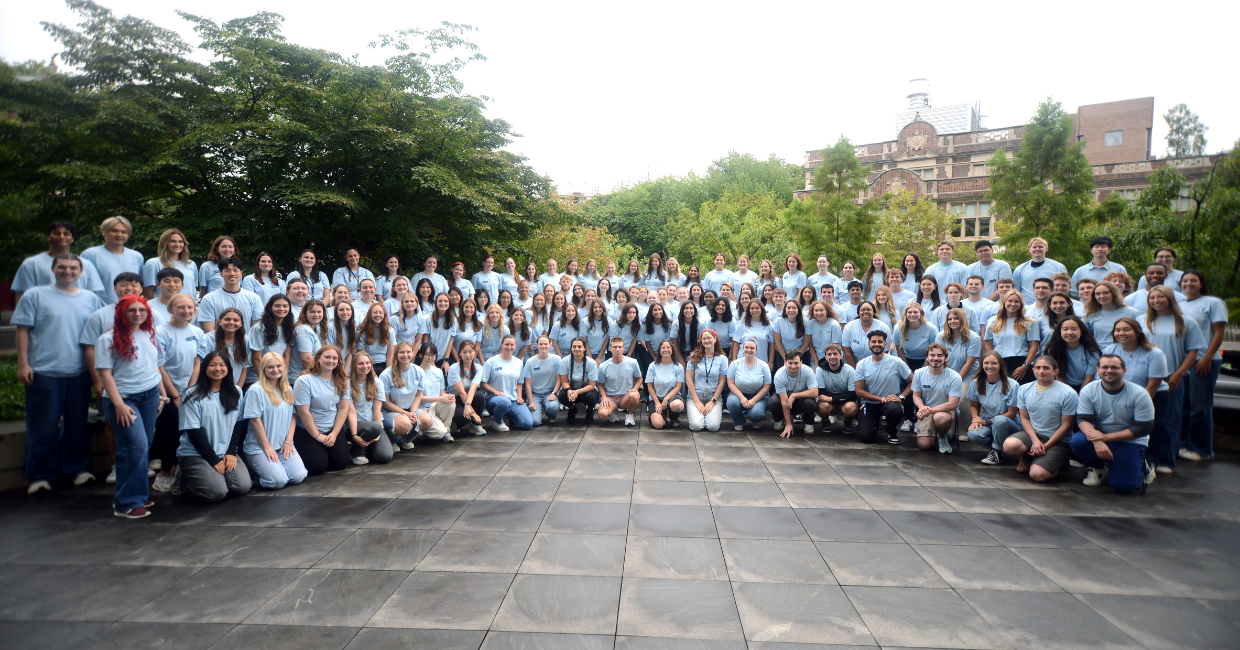
Faculty In This Story
Penn Vet’s newest cadre of veterinarians-to-be began classes this week, all starting with the “Foundational Toolkit,” a course meant to provide some of the fundamentals of what is to come. That includes some of the learning opportunities that lie ahead for a class with many interests and ambitions.
A group of 135 students came from a hefty pool of 1,653 applicants. About 80% hail from outside of Pennsylvania, and a little over three-quarters of them are female. They are young; the average age of this new class is about 22. They are also very bright. Their average GPA is nearly 3.8.
Dean Andrew Hoffman, in a welcome address during last week’s Orientation Week festivities, told the new students they had come to Penn Vet and the veterinary profession at an interesting, promising time.
“I’m optimistic about your future, and I really look forward to being able to work together to shape your generation and for you to reshape the whole world,” he said.
In addition to the prospects that await them after graduation, Hoffman told the students about some of the exciting things happening around them.
“We are evaluating the potential for a primary care community health center on the Philadelphia campus,” he said, and, in addition to that, an advanced imaging and diagnostic center at the New Bolton Center campus. On top of those, he mentioned recently completed projects at Philadelphia’s Ryan Hospital, like the new dental and oral surgery suite, and the emergency room and ambulatory unit, where the dean promised “you’re going to get a lot of surgery experience.”
For most of the students, becoming a veterinarian has been a long-held ambition.
“It’s been my dream my whole life,” said Sophia Daly, 23, of Blue Bell. “I’ve always had a fascination with animals. I was always glued to Animal Planet.”
Daly, a Notre Dame graduate, took a gap year after graduation to work in a small animal practice. Her hope at Penn Vet is to include wildlife science in her studies.
Outside of class, she’ll have extra support. Her brother, Mason, 22, just started his sophomore year at Thomas Jefferson University, and they’re sharing an apartment.
“I’m very lucky to be able to consider my brother one of my best friends, so I’m excited that we get to start this new chapter of our lives together!” Daly said.
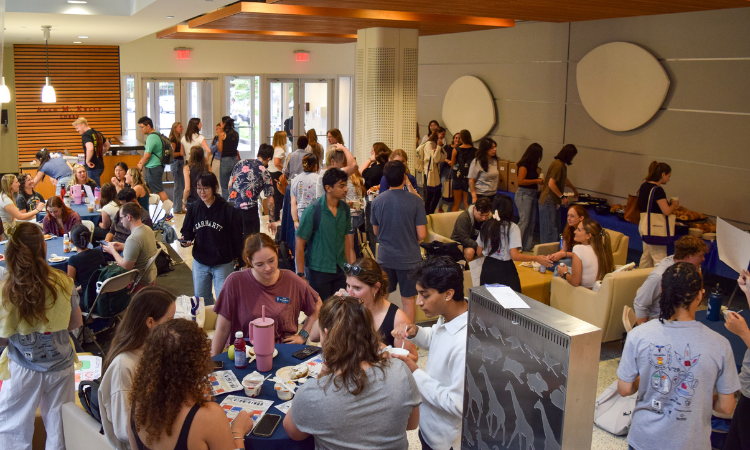
The Class of 2029 is one of many interests. Thirty-six percent of the newcomers expressed interest in small animal medicine, while 21% said they were interested in mixed animal practice. Ten percent said they plan to pursue equine medicine. Seven percent said they will focus on research. Four percent want to be large animal veterinarians, and two percent want to specialize in food animals.
Whatever their anticipated career track, a passion for animals is something these students share.
“I choose to study veterinary medicine because I want to be able to help those who can’t help themselves,” said Nannette Cruz Lopez of Puerto Rico.
Good food, fun stuff and sage advice
Orientation Week was also a time to put out the welcome mat for all these students, and the event did not disappoint when it came to swag – tee shirts, shopping bags, fridge magnets, teddy bear key chains, tension balls, Penn Vet lanyards, and more.
The food gave the largely out-of-town class a taste of things to look forward to – cheesesteaks and tomato pie bites. There were also nods to Philly’s tonier foodie side: tarragon chicken salad, nicoise tuna, and grilled vegetables.
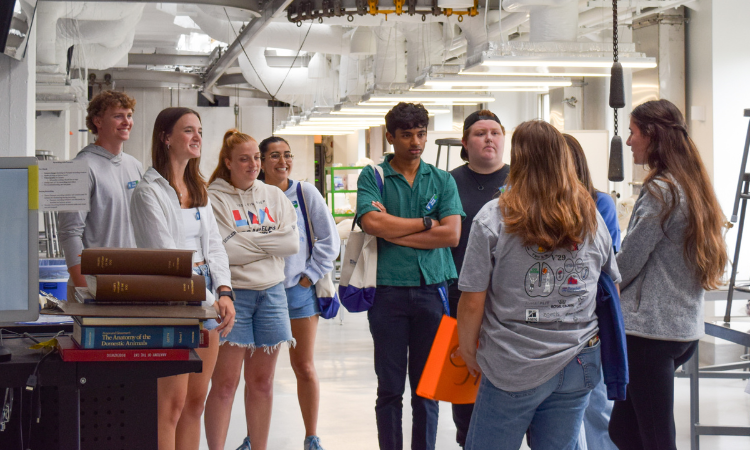
In between all this noshing was the excited buzz of tours, students meeting other students, the seeds of friendships being sown, and parents and partners looking on with pride.
There were speakers, too, and a lot of sage advice.
Veterinary school is a challenging and rewarding journey, some of the Orientation Week speakers said. Students should network, seek support when it’s needed, and practice self-care.
“I always tell students, ‘Be kind to yourself, give yourself some grace,'” said Claire Bruno, Assistant Dean of Admissions and Student Life.
Amy Durham, Associate Dean of Education, told them to embrace change.
“This is unlike anything you have done,” she said. “Veterinary school is a full-time journey, from 9 to 5 and beyond. You’ll be gaining the knowledge and skills that will shape your future.”
She also told her student audience that they will experience challenges to overcome.
“Every student will face obstacles,” Durham said. “What defines you is not the setback, but the strength and growth that come from moving forward.”
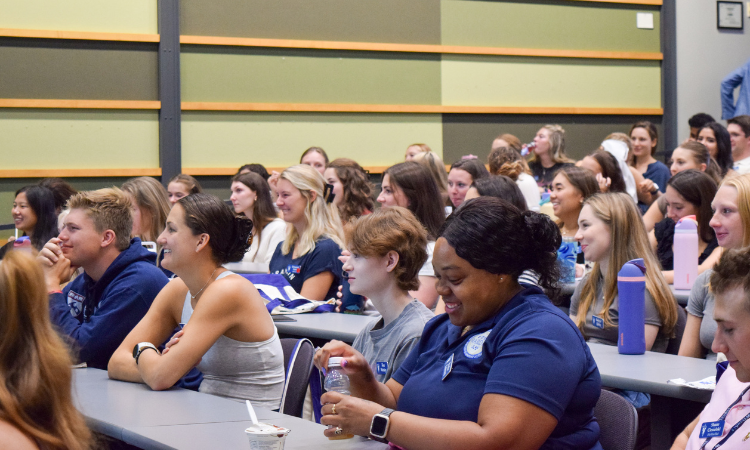
The inimitable Stephen Cole, an assistant professor of microbiology and Penn Vet graduate who does stand-up comedy, offered the students his own survival guide, “The 13 People You’ll Meet In Vet School.”
Cole’s message was about having an open heart and keeping an open mind. Form real friendships, including with people that at first seem very different from you, and live larger than campus boundaries.
“Philadelphia is a really rad and rocking city, so explore Philadelphia while you’re here,” Cole said.
In addition to all the classroom learning they will do, Cole encouraged the students to discover each other.
“Just think about the power of having people that you love and care about in your life,” he said. “You’ll find those people here in this room.”
Related News
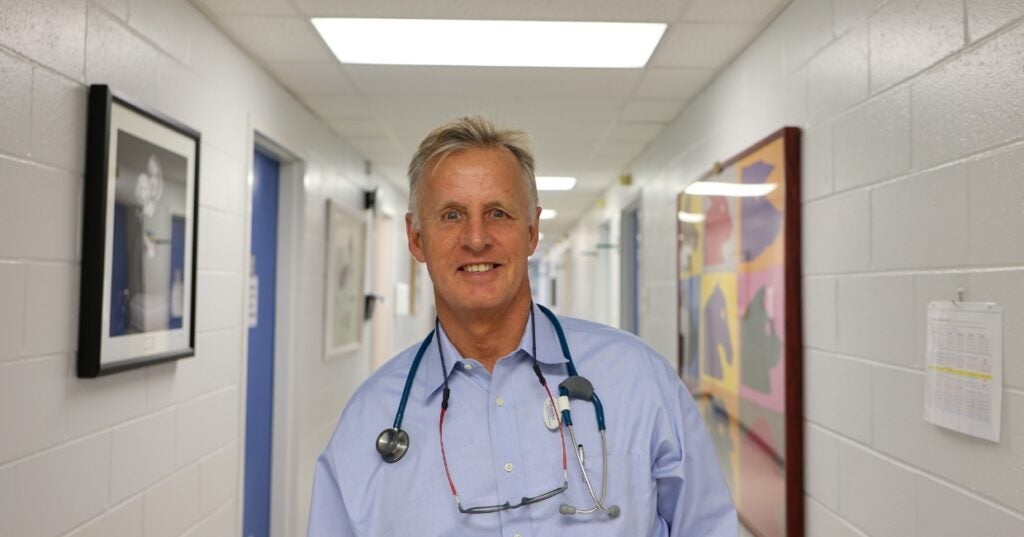
Behind the Breakthroughs: David Holt
In this edition, we sit down with small animal Professor of Surgery, David Holt, BVSc, DACVS. Dr. Holt is redefining how cancer is seen and removed during surgery. A Diplomate…
About Penn Vet
Ranked among the top ten veterinary schools worldwide, the University of Pennsylvania School of Veterinary Medicine (Penn Vet) is a global leader in veterinary education, research, and clinical care. Founded in 1884, Penn Vet is the first veterinary school developed in association with a medical school. The school is a proud member of the One Health initiative, linking human, animal, and environmental health.
Penn Vet serves a diverse population of animals at its two campuses, which include extensive diagnostic and research laboratories. Ryan Hospital in Philadelphia provides care for dogs, cats, and other domestic/companion animals, handling more than 30,000 patient visits a year. New Bolton Center, Penn Vet’s large-animal hospital on nearly 700 acres in rural Kennett Square, PA, cares for horses and livestock/farm animals. The hospital handles more than 6,300 patient visits a year, while our Field Services have gone out on more than 5,500 farm service calls, treating some 22,400 patients at local farms. In addition, New Bolton Center’s campus includes a swine center, working dairy, and poultry unit that provide valuable research for the agriculture industry.





